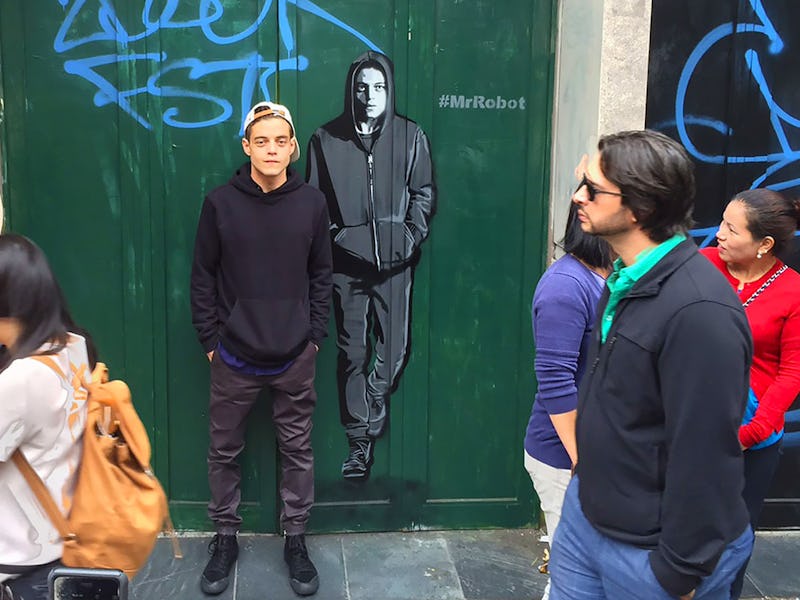The Best Moments and Episodes of 'Mr. Robot' So Far
Our staff picks their favorite parts of USA's breakout series.

‘Mr. Robot’ is this season’s unlikely TV hit thanks to its mix of dark drama and hacker-tastic plotiline. Today, our staff is picking their favorite moments from the series so far.
David Turner: After a moment of triumph seeing Mr. Robot’s plan to take out an E(vil) Corp executive succeeds, Elliot is instructed by an unknown man in a black suit “step inside of the car.” The tone of paranoia and stress, and the feeling someone is always two steps ahead, are established so effortlessly in the episode’s closing minutes. Elliot is led into a meeting room full of men in black suits with Tyrell Wellick at the center. Then Elliot pauses to ask the TV audience, “Please tell me you’re seeing this too.” Just in case one wasn’t already feeling unnerved.
Eric Francisco: Rami Malek’s eyes pierce you. It’s no mystery that Mr. Robot’s initial advertisements were just his face against blackness. Malek’s monotone voice, inflection, and demeanor compose the complex puzzle, but the completed image of that puzzle are his eyes. They freeze that chilling moment when you know he knows what you never wanted the world to know.
It was never more apparent than in the pilot when he corners the child porn trafficker. That scumbag’s desperate plea worked not because he would rot in jail, but because we ourselves feel like our secrets are too fragile. Elliot knows us in ways we don’t want anybody to.
Elliot will be a career-defining role for the young actor. As Elliot is reluctantly pushed and pushed into a world he wants nothing to do with, Malek’s performances will be one for the books. I can’t wait.
Secondly, the show’s cinematography should be studied. Perhaps to mirror Elliot’s inability to fit into the world, the show constantly breaks conventional framing. I am in awe at how much it rebels against the rules of thirds, framing subjects awkwardly to far extremes. You want to lean over just for everything to feel right, but probably nothing in the world of Mr. Robot should feel right.
Winston Cook-Wilson: I love the way the show is structured — the jerky tempo of it. At first, the jumbled-time narrative structure, diary-like voiceovers, and depressive hallucinatory quality of the show reminded me of Fight Club, and I still think, for people coming into it, that’s a good correlate. (But don’t worry — there’s none of the typical over-the-top, gross-out, pseudo-philosophical Palahniuk crap). The world is this many-headed demon that Elliot is battling, that becomes more sinister than it really is (though it’s certainly outlandish and demented) when he looks too hard at it. The show comments on the hypocrisy of society-at-large, but it only does so through Elliot’s eyes.
I like that the show does a bunch of weird narrative things (i.e. jumps around in time without warning, moves into dreams unceremoniously ) but also builds the larger hacking/corporate greed plotlines more traditionally, like in a David Cronenberg or Paul Verhoven movie. I think what’s most interesting, though: The form of the show, not just the specific action, enhances Elliott’s character; it feels like its world is filtered through his troubled psychology.
Corban Goble: We all knew the Slaterssaince was coming — it was only a matter of time — but who knew it would come this quietly? As the hacker guru “Mr. Robot,” Slater plays a rising tide. He never plays it straight, and when he seethes — as he did when he confronted Romero when the brainy hacker left fsociety — you can see a madness boiling behind his eyes. In some of the major scenes of the series so far, Mr. Robot is either noticeably absent or content to sit in the eye of the storm. In a show littered with interesting and loud performances — Carly Chaikin’s Darlene, Martin Wallström’s Tyrell — Slater’s pulled-back performance is one of the most intriguing. With a few episodes left, one can only hope to see his unpredictable character play a new card.